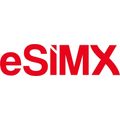Keep On Roaming® offre soluzioni eSIM Roam Like Home® che forniscono ai viaggiatori una connettività globale fluida e conveniente. Con una copertura in oltre 160 paesi, le nostre eSIM eliminano la necessità di schede SIM fisiche. Goditi un roaming senza sforzo con configurazione immediata e pacchetti dati flessibili su misura per le tue esigenze di viaggio, assicurandoti di rimanere connesso ovunque ti portino le tue avventure.

Keep On Roaming® offre soluzioni eSIM Roam Like Home® che forniscono ai viaggiatori una connettività globale fluida e conveniente. Con una copertura in oltre 160 paesi, le nostre eSIM eliminano la necessità di schede SIM fisiche. Goditi un roaming senza sforzo con configurazione immediata e pacchetti dati flessibili su misura per le tue esigenze di viaggio, assicurandoti di rimanere connesso ovunque ti portino le tue avventure.
Piani dati eSIM Keep On Roaming per la Repubblica Dominicana
Domande frequenti
Keep On Roaming offre eSIM con dati illimitati per la Repubblica Dominicana?
Keep On Roaming non fornisce un eSIM con dati veramente illimitati per la Repubblica Dominicana. I piani che riportano “UNLIMITED” nel nome offrono effettivamente un limite fisso di 1 GB al giorno, che viene applicato quotidianamente per tutta la durata del piano. Una volta che i dati si esauriscono più rapidamente, la velocità della rete viene ridotta, anche se la velocità esatta ridotta non è indicata.
Invece, Keep On Roaming offre piani di dati fissi che possono rappresentare un miglior rapporto qualità/prezzo per i viaggiatori che necessitano di più dati. Esempi includono il piano da 100 GB per 30 giorni al prezzo di $102.00, il piano da 50 GB per 30 giorni a $58.00, il piano da 20 GB per 30 giorni a $26.00, il piano da 10 GB per 30 giorni a $21.00 e il piano da 5 GB per 30 giorni a $17.00. Questi piani forniscono una quantità di dati più ampia e possono risultare più convenienti per gli utenti ad alto consumo di dati.
Keep On Roaming offre eSIM per la Repubblica Dominicana con numero di telefono e SMS?
Keep On Roaming non fornisce piani eSIM per la Repubblica Dominicana che includano un numero di telefono locale o la possibilità di inviare SMS. I viaggiatori che hanno bisogno di connettività possono acquistare l’eSIM solo dati e utilizzare applicazioni VoIP come WhatsApp, Telegram o iMessage per chiamate vocali e messaggistica.
Quanti piani dati offre Keep On Roaming per la Repubblica Dominicana?
Keep On Roaming offre 15 piani dati per singolo paese per la Repubblica Dominicana, senza piani multi‑paese disponibili al momento. I piani spaziano da circa $9 a $102 e forniscono quote dati tra 1 GB e 100 GB. Tra questi, alcuni pacchetti sono piani dati fissi, che offrono una quantità specifica di dati per un periodo definito, mentre altri impongono un limite giornaliero di dati, limitando l’uso ogni giorno durante il periodo di validità. Il tethering è consentito su alcuni piani.
Riepilogo con Gen AI. Ultima modifica:




